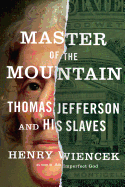
Henry Wiencek studied George Washington's convoluted relationship to slavery in An Imperfect God; with Master of the Mountain, he turns his attention to Thomas Jefferson. As one would expect, Sally Hemings is a crucial part of the story, but Wiencek also meticulously records the experiences of many others among the more than 600 slaves Jefferson owned in his life, offering a detailed portrait of daily life at Monticello.
After speaking out eloquently about the need for emancipation early in his life, Jefferson not only let pass several opportunities to push for abolition but worked to maintain the existence of slavery, noting the profits to be had--even though in public writings and correspondence with anti-slavery activists, Jefferson continued to claim a devotion to human rights and disgust with the "peculiar institution." Wiencek appears briefly to consider the forgiving popular characterization of Jefferson's relationship with slavery as "compartmentalized" or "complex." But as Jefferson devolves from a youthful, idealistic opponent to a staunch defender of slavery, Wiencek firmly condemns Jefferson's pretense of virtue, put to the lie by the abuses at Monticello. Master of the Mountain is well-documented and detailed without being tedious. The stories of real people come alive, making Jefferson's wrongs all the more painful and his hypocrisy the more outrageous. The final chapter calls this founding father to account in no uncertain terms. --Julia Jenkins, librarian and blogger at Pages of Julia

